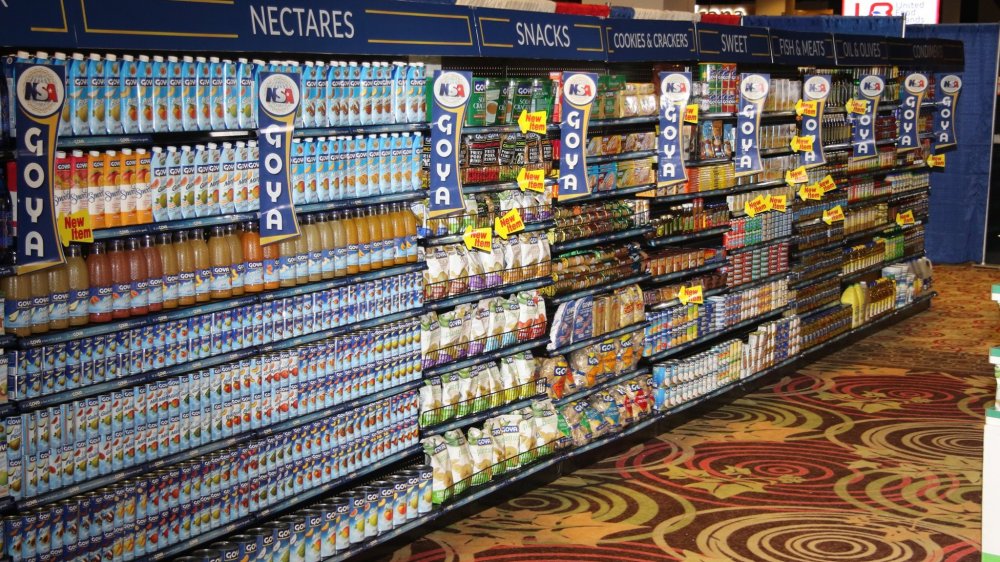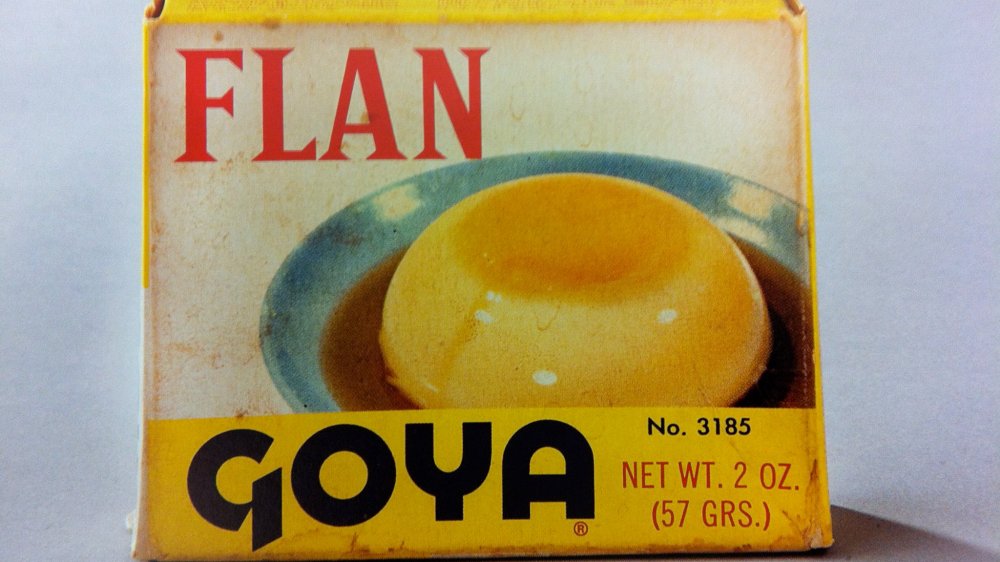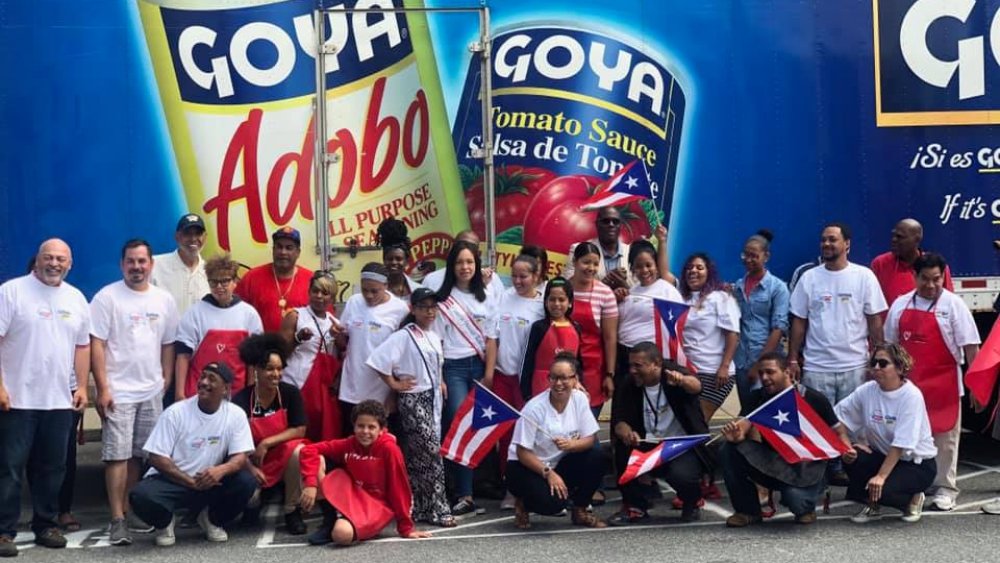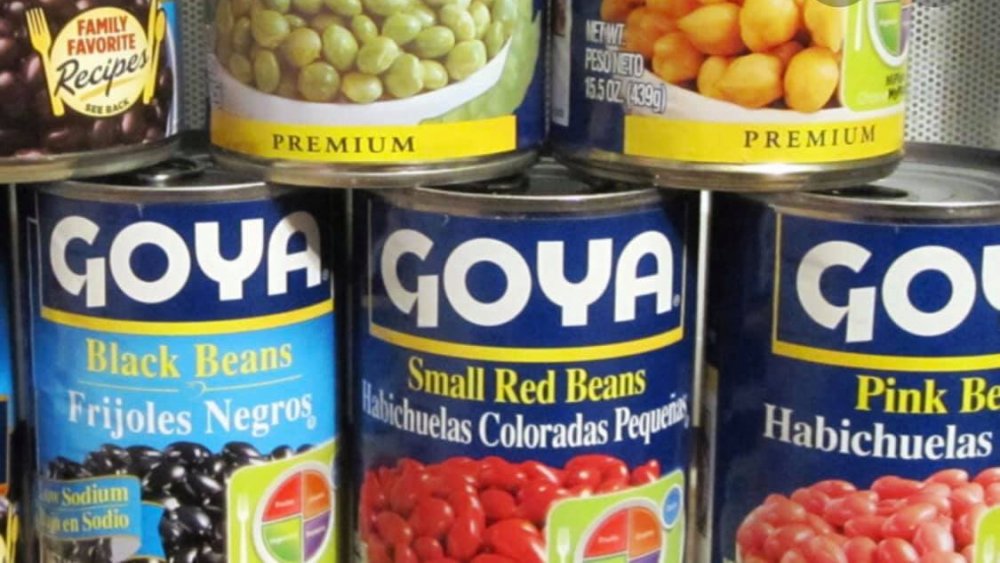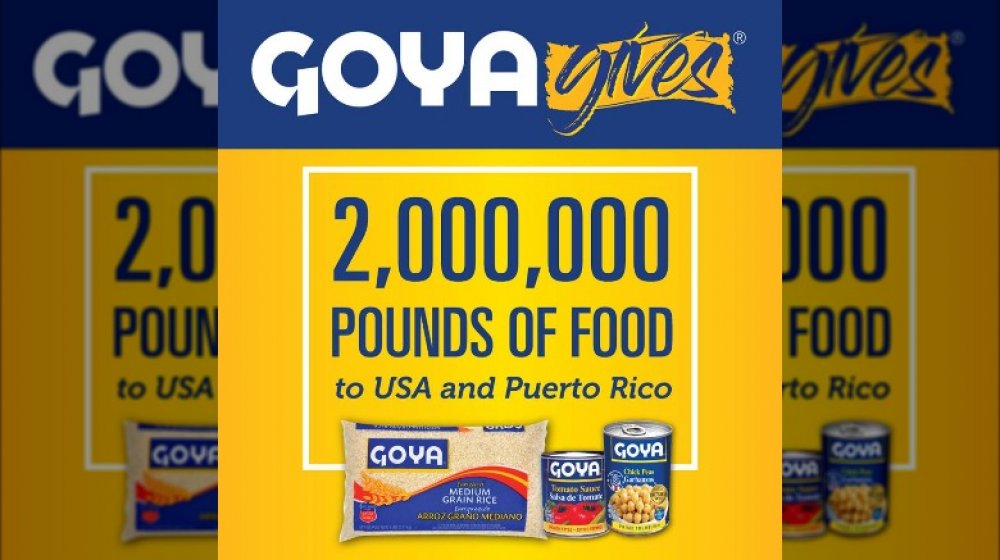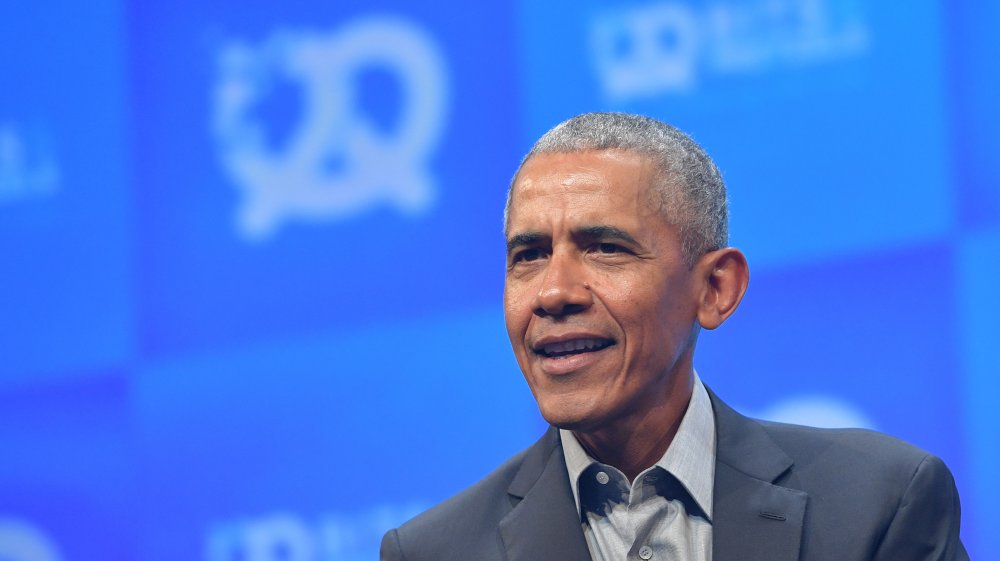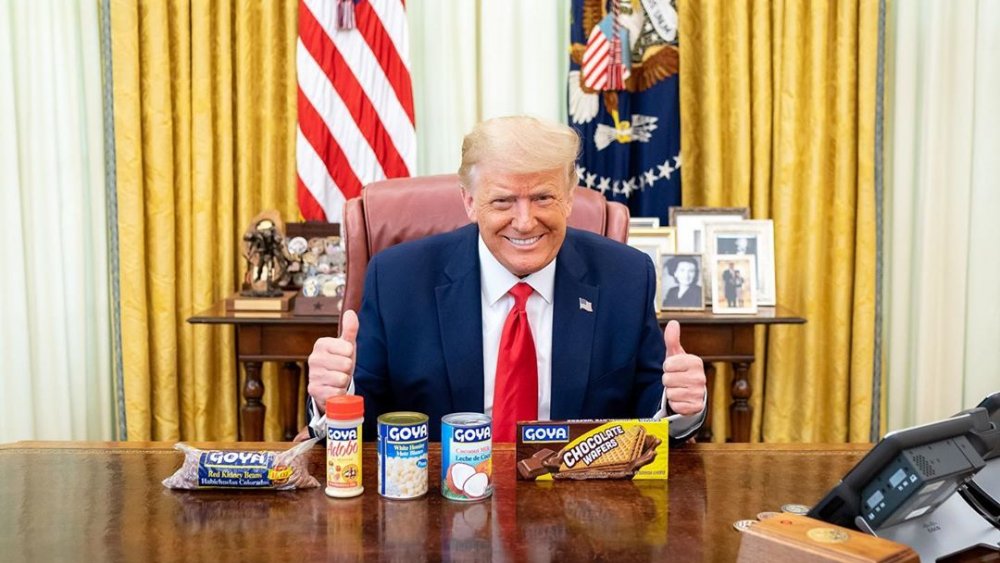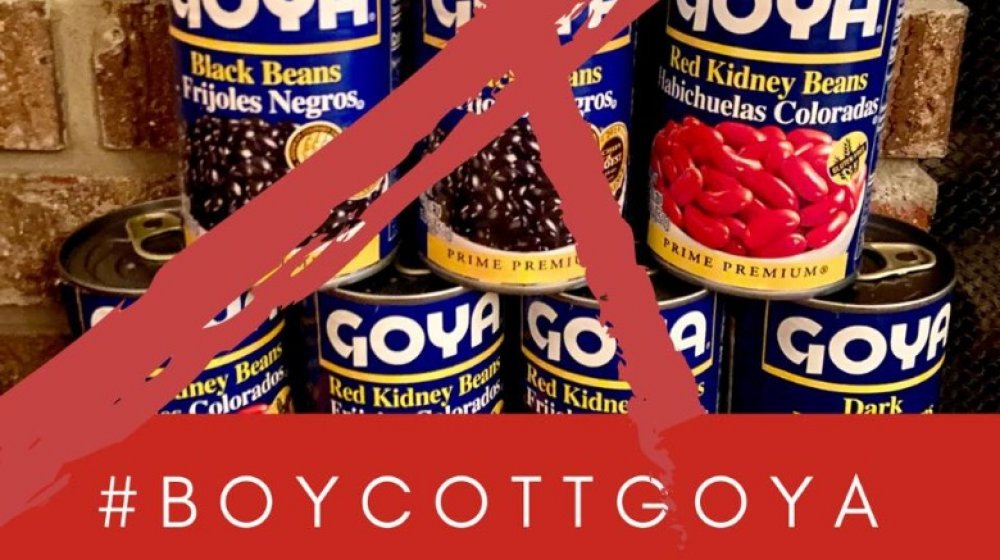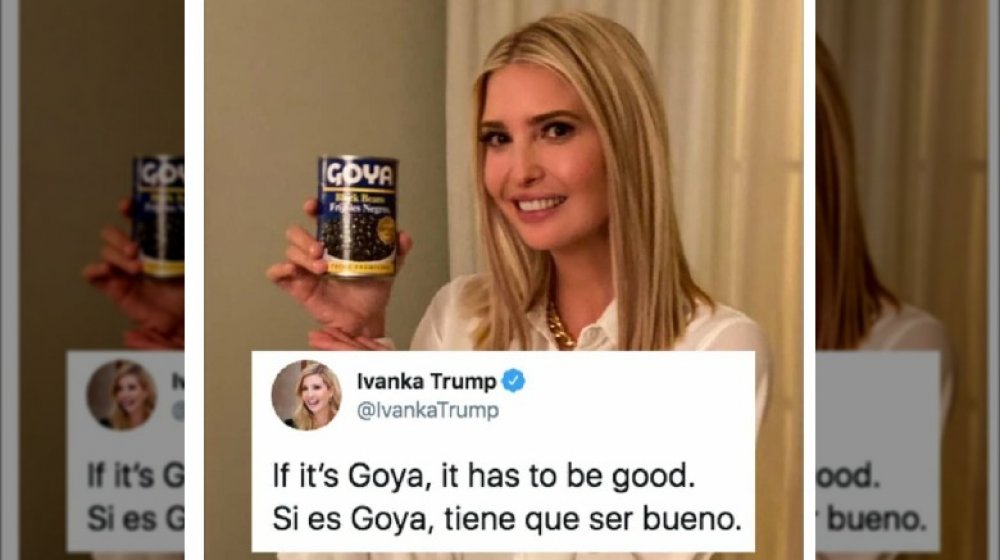The Truth About Goya Foods
Chances are good that if you open your pantry or your refrigerator, you probably have a Goya Foods product or two sitting on a shelf. You may even have a lot of it. Maybe this was a conscious decision — you're a brand loyalist who loves the Goya products — or maybe you bought the beans or rice (or any number of other foods) because it was a good deal. Either way, you probably never gave it too much thought before the company made the news in 2020 for remarks the company's chief executive, Robert Unanue, made about President Donald Trump when appearing at the White House for a rollout of the administration's Hispanic Prosperity Initiative. The ensuing boycott and counter-boycott flooded social media channels and every major news outlet, placing the food manufacturing company at the center of nearly every headline. Who could've imagined that beans would become politicized, driving purchases based on political party?
Regardless, there's more to Goya's history as a company than a few words spoken by the company's chief executive at a singular event. Here's what you really need to know about Goya Foods.
The founder of Goya Foods purchased the name from a sardine importer
Goya Foods was founded in 1936 when Don Prudencio and Carolina Unanue, immigrants from Spain, by way of Puerto Rico, saw a potential market for selling Latin foods in the New York and New Jersey region. Unanue, who according to Grubstreet, was a fan of the artist Francisco Goya, purchased the name "Goya" from a Moroccan sardine-importer for $1. He figured that naming his company "Goya" would be easier for people to pronounce than if he were to use his own last name.
According to the company's website, Goya started by selling authentic Spanish products, including olives, olive oil, and (of course) sardines, from a storefront on Duane Street in Lower Manhattan. They focused on selling to local, Hispanic families, and gradually started distributing their products to bodegas in the area. They had a commitment to selling high-quality products that tasted fresh from the company's get-go, and soon coined Goya's long-standing credo, "If it's Goya, it has to be good."
The Goya Foods company expanded slowly
Given the Unanue family's Spanish heritage, it made sense that Goya Foods started out small by selling authentic Spanish foods, but in the 1900s, New York and New Jersey experienced surges in Hispanic immigrants from different countries, providing Goya with the opportunity to branch out into different types of Hispanic cuisine. According to a 2013 article in Forbes, when World War II ended, a wave of immigrants from Puerto Rico made their way to New York. This inspired Prudencio Unanue Ortiz to add yucca, plantains, and pigeon peas to Goya's product line. Then, when Cubans and Dominicans immigrated in the 1950s and 1960s, the company also added black beans, guava paste, and coconut.
This targeted, local marketing provided steady and consistent growth, allowing the company to expand throughout the Eastern United States by the 1980s. And as more Latinos continued to immigrate to the United States from Mexico and Central America, there was a greater population (of Latinos and non-Latinos alike) interested in consuming Hispanic cuisine. As such, the Goya Foods product line and distribution only continued to grow.
Goya Foods is the largest Hispanic-owned food company in the US
Goya Foods slow and steady (and smart) expansion over 80 years has paid off quite nicely for the brand, landing the company at the top of the food chain (so to speak) of Hispanic-owned food companies in the United States. According to an article in Forbes, Goya had revenues topping $1.3 billion in 2012 (up from just shy of a billion in 2010), which qualified it as one of the fastest-growing food companies in the United States, as well. It's a title they still hold today, as their numbers continue to grow right along with their product line.
So what exactly does it mean to be the largest Hispanic-owned food company in the United States? According to the business analytics website, Dunn & Bradstreet, Goya Foods sells more than 2,500 Hispanic and Caribbean grocery items — everything from oils to seasonings, to juices and coffee, to of course, canned foods — which is a far cry from its humble beginnings selling just olives and olive oil. The company's website also notes that they employ more than 4,000 people, operating 26 manufacturing and distribution centers across the country and in Puerto Rico, the Dominican Republic, and Spain. It's also important to note that the company is still fully owned and managed by the Unanue family, although in 2019, there was some indication that a sale might be afoot.
Marketing to non-Hispanics caused business to boom for Goya Foods
In what was possibly one of the smartest moves the Goya Foods company ever made, in 2005, chief executive Bob Unanue and his brother Peter, decided to hire the Grey Group's Wing agency to specifically market to non-Latinos. According to an article in Forbes, the ads that ensued included a Black woman stirring Goya's yellow rice, and a blonde, white woman seasoning chicken with adobo. The marketing campaign worked like a charm, and by the end of 2012, the brand had gained more customers in the areas of the country where the ads were targeted, inspiring the brand to continue marketing to non-Hispanics.
The timing was also perfect — according to a CNBC article, ethnic food sales have been growing substantially thanks to more explorative millennials, with products like ethnic sauces and seasonings (hello, adobo!) and exotic-flavored chips (yucca chips, anyone?) growing by 20-percent between 2013 and 2017. And this growth is in lock-step with continued growth of the Hispanic population, which is expected to reach 112 million by 2060. All-in-all, Goya Foods is positioned to continue to grow for the foreseeable future.
Goya Foods is an Eva Longoria fan
As far as corporate headquarters go, Goya Foods' offices in New Jersey are fairly unspectacular — company execs aren't trying to wow their employees a la Apple or Google. But there's one thing about the lobby that stands out: A poster of Eva Longoria hangs there, for everyone to see. Despite copious research, it's not clear why the cover of this Latina magazine earned its place on the hallowed halls of Goya, but clearly someone is a fan. An article on Grubstreet surmises it must be a shoutout to the brand's healthy foods, suggesting Goya Foods hang a sign below the poster stating, "Body by frozen mixed vegetables." That seems a bit of a stretch.
More likely, the poster hangs there because Eva Longoria is a beautiful, Latina woman who represents many of the same things the company stands for. For instance, she's a self-made woman who embraces her Hispanic culture and supports the Hispanic community — just like Goya Foods.
Goya Foods has ranked high for social influence and community support
Despite making the conscious decision to begin marketing specifically to non-Latinos (while also continuing to market to its Hispanic base), Goya Foods has never lost sight of the important role they play within the Hispanic community. According to Goya's website, in 2018 Goya Foods was ranked number two in the United States as a food brand with positive social influence and community support. Through their Goya Gives program, the company donates millions of pounds of food each year to families in need, as well as supporting culinary scholarships for high school seniors and special events, like free soccer clinics.
The company is particularly interested in donating food during and following natural disasters, such as Hurricane Maria in Puerto Rico. And they've made a concerted effort to offer donations to those in need during the 2020 COVID-19 pandemic. According to the brand's Facebook page, Goya donated 40,000 pounds of food to distribute in bags of groceries to families in the New York City area who were impacted by the virus. That many veggies, beans, and more from the company can go a long, long way.
Goya Foods received honors from the Obama Administration
According to a 2011 Cision PR Newswire press release, Goya Foods representatives traveled to the White House where the company's chief executive officer, Robert Unanue, was given the honor of introducing President Barack Obama at a reception that was held in celebration of Hispanic Heritage Month. It was here that President Obama honored Goya Foods for its history with and commitment to the Hispanic community — the brand being the only company President Obama saluted in such a manner.
This meeting started an ongoing relationship between Goya Foods and the Obama Administration. In 2012, Goya Foods collaborated with First Lady Michelle Obama and the United States Department of Agriculture to provide "MiPlato" resources to Hispanic families. According to a White House press release, Goya Foods committed resources to promote the USDA's MyPlate (MiPlato, in Spanish) to help families make healthier, balanced choices about food using pamphlets, brochures, cookbooks, and even coupons.
First Lady Michelle Obama stated, "Everything that Goya is doing — from the MiPlato posters and pamphlets to cookbooks and recipes — centers around the idea that we parents can make simple changes to help their children lead healthier lives." In addition to educational resources, you can also find the MiPlato icon on many Goya Foods products, as well as on recipes found on the brand's social media pages.
Goya Foods is the largest user of solar energy among Hispanic owned food and beverage companies
Goya's commitment to community expands beyond scholarships and food donations. According to the Goya Foods website, the brand understands the impact food and beverage manufacturing has on the environment, and they take responsibility for "leading the way for environmental change." As they have grown and expanded, opening new facilities around the country and the world, they've thought critically about how to reduce their carbon impact. For instance, as the largest user of solar energy among Hispanic-owned food and beverage companies, Goya Foods has earned a place as one of the top 10 corporate solar users in the industry within the United States.
There are many facets to Goya's environmentally-friendly building designs —all of them equally important to the outcome — but a few of the highlights include:
- Skylights for natural lighting to reduce the need for overhead lights
- Waterless urinals to cut down on water consumption
- Lights on motion sensors that turn on when there's activity, and automatically turn off when there's no activity
- Solar systems that generate 9.8 million kilowatt-hours of electricity per year, which is enough to provide electricity to 1,265 homes per year, and is the equivalent of avoiding carbon dioxide consumption of approximately 948,959 gallons of gasoline per year
The point to all of this is, Goya Food is being proactive in considering the environment as it expands its operations. And really, Goya Foods could be used as a stellar example of private companies taking personal responsibility for the world's environmental problems.
The CEO of Goya Foods praised President Donald Trump
For all the good Goya Foods has done over the years, the company found itself in hot water in July 2020 after company CEO Robert Unanue made positive comments about President Donald Trump when he appeared at the White House to help roll out the Trump administration's Hispanic Prosperity Initiative. This initiative is intended to improve access to educational and economic opportunities for Hispanic Americans — a positive initiative, to be clear, and one that is aligned with Goya Foods' long history of providing support to the Hispanic community.
So what's the problem? President Trump doesn't exactly have a strong history of supporting the Hispanic community, and he often disparages Latinos and Latin culture. One well-known example of this is when he ran his original Presidential campaign partly on the concept of "building a wall" between Mexico and the United States to reduce the influx of immigrants from the south. In 2016, TIME even published an article on "Here Are All the Times Donald Trump Insulted Mexico." And that was in 2016... certainly, the insults have racked up in the years since.
According to an article in The New York Times, Unanue stood next to President Trump in the Rose Garden and stated, "We're all truly blessed at the same time to have a leader like President Trump, who is a builder," before going on to compare President Trump to his own grandfather, the founder of Goya Foods.
#Goyaway trended with backlash from the Latinx community
The backlash that resulted from Goya Foods CEO Robert Unanue's comments about Donald Trump was swift and harsh. The Hispanic community largely views President Trump as someone who incites racism from his followers, which has resulted in increased violence against Latinos. In an article in The New York Times, the deputy vice president for policy and advocacy for UnidosUS, a Latino civic engagement organization, Clarissa Martinez de Castro said the speed and size of the boycott showed "how raw people in the community feel about the president." She stated that many Latinos blame Trump for attacks that have taken place on undocumented immigrants, as well as violence against Latinos, including the shooting massacre that took place in El Paso, Texas in 2019. The shooter in this instance was charged with federal hate crimes after stating he wanted to kill as many Mexicans as he could. For this reason, Trump's approval from the Hispanic community has hovered around only 25 percent in recent polls.
The point being, many Latinos felt deeply betrayed when Unanue — a true leader in the Hispanic community — chose to stand next to Trump and offer him praise as a leader and a builder. What happened next was a call to boycott and images flooding social media of people clearing their pantries of Goya products and throwing them in the trash. Hashtags #boycottgoya and #goyaway started trending almost immediately on Twitter, and other politicians, like Democrat U.S. Representative Alexandria Ocasio-Cortez, took to their own social pages to commit to the boycott. Ocasio-Cortez stated, "Oh look, it's the sound of me Googling 'how to make your own Adobo.'"
The boycott of Goya Foods soon resulted in an anti-boycott
Of course, because the world of politics is unbelievably polarized, as soon as many Hispanic Americans and Democratic politicians, like Representative Alexandria Ocasio-Cortez, started calling for a boycott, Republicans immediately responded with a #BuyGoya campaign to support the brand. Republican politicians, like Senator Ted Cruz, spoke out in support of Goya Foods while pointing fingers at the Democratic party, tweeting, "Goya is a staple of Cuban food...now the Left is trying to cancel Hispanic culture and silence free speech. #BuyGoya." He also said the boycott was an example of "the spirit of intolerance."
Even President Trump and his daughter, Ivanka Trump, got on board, seeming to use the opportunity to align themselves with a popular Hispanic food company. Ivanka Trump tweeted in both English and Spanish the company's slogan, "If it's Goya, it has to be good," while posing with a can of beans, and her father posed in the Oval Office, giving a thumbs up in front of Goya products. According to The New York Times, this has brought up ethical concerns about government employees using their influence to endorse specific products, although no specific charges have been filed.
It's unclear who the "winner" of the boycott and anti-boycott ultimately will be, as both sides continue to rage on, but at the end of the day, the loser is likely the American people. When a can of beans can literally open such a can of beans and spur animosity and hatred from both ends of the political spectrum, something is clearly broken in modern politics.
